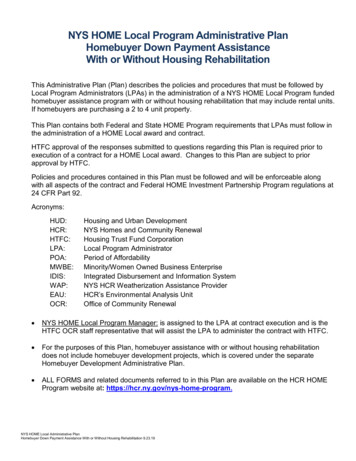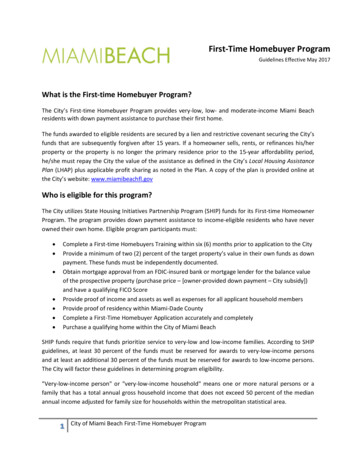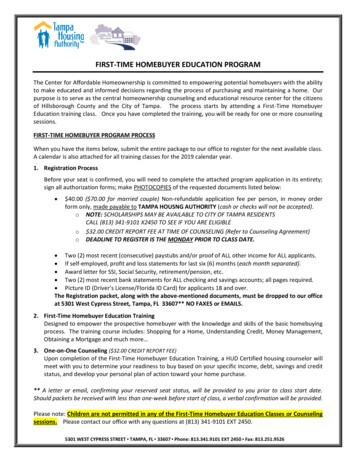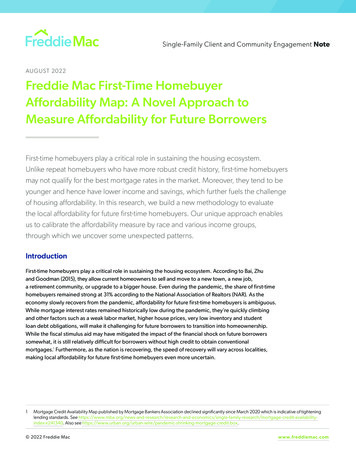
Transcription
FIRST TIME HOMEBUYER'S GUIDEwww.GuidanceRealty.com
E-Book First Time Homebuyer's GuideFIRST TIMEHOMEBUYER’S GUIDEIf you’re ready to purchase a home, but not sure where to begin, you’re in a similar situation as most first-timehomebuyers. Purchasing a home is a complex and time-consuming task. While the reward and benefits ofowning a home are great, becoming a homeowner can be overwhelming if you’re not sure where to start. Thishomebuyer’s guide will equip you with the knowledge and point you in the direction to begin yourhome buying journey.2
E-Book First Time Homebuyer's Guide1. DETERMINE YOUR BUDGETWhen you make the decision to purchase a home, a good way to begin is to determine your budget.Purchasing a home is a major financial decision, and although it can save you money in the long-run,the short-term costs can be very expensive. Determining the maximum amount that you can spend onthe total costs to purchase a home will help to ensure that you do not find yourself in an undesirablefinancial situation.HOW MUCH MONEY DO YOU NEED TO BUY A HOME?The price of a home will vary depending on a variety of things. When trying to determine how much you will need for a home, you will need to considerboth direct and indirect factors, as well as obligatory costs that affect the price of a home.Indirect Factors:Direct Factors:Location – Location factors that affect your life and your lifestyle areimportant, and thus factor into the cost of a home. For instance, proximityto good schools, centers of faith or dining and shopping and even the regionor state where you choose to live are location factors that can either raise orlower your home cost.Inspection – Depending on your home, you may opt to have inspectionscompleted – such as a home inspection, pest inspection, chimneyinspection, electrical inspection, and a heating and air conditioninginspection. These will increase the cost of your home purchase.Appraisal – An appraisal is a formal process for evaluating your property'svalue and is required by most states. The appraisal cost will vary perhome, and is necessary to have before receiving financing.Comparable Properties – Comparable properties are the properties that arefor sale or have recently sold in the area where you choose to buy your home.While comparable properties will not precisely determine the cost of yourhome, they can be a factor in helping to ensure the value of a neighborhoodor community.Home Condition – It’s not uncommon for first-time homebuyers topurchase a fixer-upper or a home that requires repairs or maintenance.If you are interested in a fixer-upper, it’s a good idea to get estimates ofrepairs to give you a realistic portrait of the total cost of your home.Real Estate Market – The real estate market fluctuates daily due to rates,demand for and the supply of housing, thus affecting the cost of your home.Obligatory Costs3 Payment (Good Faith Deposit) – A Good Faith Deposit is apayment made by a buyer to show that he or she has the intentionof completing a deal and is typically ranges between 1% and 3%. Closing Costs – Closing costs are expenses over and above theprice of the property in a real estate transaction and include, but arenot limited to: origination fees, appraisal fees, title searches, propertytaxes, and other fees.
E-Book First Time Homebuyer's Guide1. DETERMINE YOUR BUDGETCONT.Credit monitoring companies such as Transunion and Experian canprovide you with a credit report, including your credit score so that youknow where you stand. Once you know your credit score, you can takeappropriate actions to adjust it.HOW DO YOU SAVE TO BUY A HOME?Whether your home buying journey is starting off, or you started savingprior to reading this guide, saving for a home is an important part of thejourney. Like the factors and costs that we mentioned above, saving fora home can have an impact on your home price. The more you save,the more you have for a down payment, which can make monthlypayments lower. Dispute any errors that you see. It’s not uncommon for creditreports to contain errors. If you see any, contact the organizations thatsupplied the information. Be sure to have documentation that refutesthe error. This process may take time, so it is important to startsooner than later. Pay bills on time. If needed, set up automatic drafting from yourchecking account to pay your bills. This will guarantee that your billsare paid on time without you having to remember all of the due dates. Pay off debt. The higher your debt-to-credit-ratio, the worse yourcredit score will be. Being intentional about paying off debt willimprove the debt-to-credit-ratio so that it does not look like you havemore debt than you can afford. The goal is to use less than 50% peraccount of your available credit. Erase one-time mistakes. Believe it or not, you can contactcompanies and ask them to remove late payment marks from yourrecord if those instances are a one-off. Small adjustments can be aneasy boost for your credit score.Some things that you can do to save for a down paymenton a house are: Eliminate unnecessary expenses – There are many ways to savemoney by making lifestyle changes that prioritize smarter spending.For instance, buying groceries and making lunch versus eating out forlunch can save nearly 800 a year. You can also save 3,000 a year byreplacing your monthly cable service with Netflix or similar streamingaccounts. The idea is to make small changes in your spending habits toreap a greater savings in the future.Open a savings account – It’s easy to say that you want to save money,but that’s hard to do when the money you’re saving is not separatedfrom your spending money. Opening a savings account can ensure thatyou cast the money you’re saving to an account that is not as easilyaccessible. You can also allocate partial amounts of your direct depositto a savings account so that saving will become an automatic part ofyour financial activity without you having to remember or struggle todo it.In addition to saving, you should also take actions to improve your creditscore.Your credit score is a key factor for the type of home financingyou may qualify for. It also affects the amount required for an initialpayment, the financing amount, and the profit rate you are offered fromGuidance Residential.4
E-Book First Time Homebuyer's Guide2. RESEARCH FINANCING OPTIONSFinding a home finance provider that offers services tailored to your lifestyle is important. And, if you’rea first-time homebuyer, you will want to research finance providers and their services to make the bestdecision. In the past, a major stumbling block for Muslims wanting to own a home was their difficulty findingfinancing that didn’t require the action of paying interest.Most conventional home financing is interest based. The good news is that Shariah-compliant homefinancing has become increasingly available. Guidance Residential is a Shariah-compliant home financingprovider that was created to help the underserved Muslim American segment achieve homeownershipwithout compromising their faith. While Guidance Residential’s program is Shariah-compliant, it is open toconsumers of all faiths.PRE-APPROVAL AND CONDITIONAL APPROVALObtaining Pre-Approval and Conditional Approval letter begins with a simple stepat Guidance Residential. You can complete our Pre-Qualification form on www.GuidanceResidential.com to get introduced to an expert Account Executive whowill then guide you through the process to receive Pre-Approval and eventuallyConditional Approval letters. Pre-Qualification does not require a credit check andtakes 10 minutes to complete online.Once you are introduced to an Account Executive, you’ll learn whether you canobtain a Pre-Approval letter. You do not have to file an application to obtain aPre-Approval. A Pre-Approval letter means that, with your authorization, we havereviewed your credit history obtained from a credit reporting agency. Althoughyou have not submitted an application, a Pre-Approval letter results from a morein-depth look at your financial information and will tell you the most you can afford tospend. It’s not a guarantee that you’ll be approved when you actually apply, but it is auseful aid as you start shopping for a home.5For a Conditional Approval, on the other hand, a review is doneonce you file an application. It is a confirmation that you meetthe financiers requirements based on information received inthe application and credit reports a well as a verification of yourincome. Once you are Conditionally Approved, you may be offereda financing commitment once all information in your application isverified, all underwriting requirements are satisfied and acceptableproperty related reports are provided and approved. You willdiscover later in the home buying journey, that having ConditionalApproval can put you at an advantage over other homebuyers.Home sellers are more likely to take homebuyers with ConditionalApproval more seriously and prioritize their offers beforehomebuyers who do not have Conditional Approval.
E-Book First Time Homebuyer's Guide2. RESEARCH FINANCING OPTIONSCONT.FINANCING OPTIONSThe types of financing available is also important to research. For one, youwant to be sure that you can get financing for the type of property thatyou are interested in purchasing. Secondly, you want to be sure that thefinancing is truly Shariah-compliant. Guidance Residential offers a variety ofcompetitive financing options for first-time homebuyers.Types Of Financing We Offer:Purchase financing First-time Homebuyer’s Program with the option to pay as little as 3%down Fixed and Adjustable rates for 30-, 20-, and 15-year contracts Conforming and Conforming Jumbo financing Single family, condominiums, townhomes, Planned Unit Developmentsand 2 to 4 units financing Owner occupied, second home and non-owner occupied (investmentproperty) financingThe Acquisition Payment serves in buying Guidance Residential’s portion ofownership over the predetermined period of time and the Profit Payment isakin to rent or use of property of another.For instance, if you are looking to buy a 300,000 home and you have 30,000 of your own money to contribute towards the purchase of thehome, Guidance will contribute the remaining 270,000 in funds to purchasethe home together. Guidance will purchase the property along with youand we will form a co-ownership agreement stating that we both own theproperty together. Then we set up a 15, 20, or 30-year contract in which youmake a monthly payment to Guidance Residential. A portion of that paymentwill go towards buying out Guidance Residential’s ownership. The otherportion of the monthly payment is for the exclusive use of the property.The utilization fee that we charge you will decrease every month as ourownership in the property decreases and the portion that goes to buyingGuidance’s ownership will increase by that same amount so that the monthlypayment stays constant.In accordance with the terms of the co-ownership agreement, you can sellthe property at any time and any profit from that sale will be 100% yours.For instance, if after 5 years, you sell this property for 350,000, that extra 50,000 will be all yours.THE DECLINING BALANCECO-OWNERSHIP PROGRAMWhatever your property choice may be, you will find peace in knowing thatour financing process is based on a co-ownership program that allows you tobecome a homeowner and still follow Shariah principles.In the Declining Balance Co-ownership Program, Guidance Residentialand the homebuyer engage in a co-ownership venture where each owns apercentage of the home, in proportion to the equity they each contributed.Homebuyers are required to make monthly payments to GuidanceResidential over a predetermined period of time in order to completelybuy out Guidance Residential’s ownership in the property, and own theproperty outright. The monthly payment consists of two portions; (1) anamount for the acquisition of a portion of Guidance Residential’s ownershipinterest (Acquisition Payment) and (2) the other for the exclusive use ofthe entire property, even though Guidance is a co-owner (Profit Payment).6
E-Book First Time Homebuyer's Guide3. SHOP FOR A HOMEAs with other steps in the home buying journey, searching for a home can be overwhelming. GuidanceResidential helps first-time homebuyers find peace of mind – not only with Shariah-compliant financing –but also with resources that simplify the process and help you tackle each step. We provide a streamlinedprocess that connects you to a licensed real estate agent and platform that lets you search properties andfind a local real estate agent to assist you with your home buying process.FIND A REAL ESTATE AGENTYou should conduct research for real estate agencies where you desire topurchase a home to find an expert licensed professional. It is important toconduct interviews and refer to client testimonials and referrals to identifythe best agent to assist you in your home buying journey. You can useGuidanceRealty.com, our real estate partner site, to search for qualified realestate agents.SEARCH FOR YOUR PERFECT HOMEAND NEIGHBORHOODAs a first-time homebuyer, you probably search for homes day and night– which is a good way to expose yourself to options and get a better ideaabout what you like. At the same time, having too many options can distractyou from moving forward with the process and potentially missing out onyour perfect home. A good thing to do is narrow down your search.GuidanceRealty.com offers customers a simple, cost-effective and consumerfriendly solution to purchase a home. You can use the site to search foragents. You can receive up to a 500 appraisal credit at closing costs whenyou finance with Guidance Residential and work with a GuidanceRealty.comaffiliated buyer’s agent. 7Identify the neighborhood that more closely matches yourpreferences. Make a list of must-haves and nice-to-haves to comparewhat is most important to you in a neighborhood. For instance,close location and proximity to specific public or Islamic schoolsand mosques or places of worship could be must-have for you whiledining and entertainment near your neighborhood could be anice-to-have option.Select homes within the neighborhood that fit your price range.Consult your real estate agent for advice and information if you find itdifficult to narrow down your home choices.Take tours and attend open houses for as many homes as you needto find the perfect home. Inspect each home thoroughly, take photosand make notes so that you can reference this information whenyou’re comparing your options.
E-Book First Time Homebuyer's Guide4. MAKE AN OFFERIn a competitive real estate market, or one where homes sell almost as quickly as they are available for sale,the person who ends up acquiring the property is often the one who offers the price the seller is asking, orsometimes a higher amount. In a slow market, in contrast, the successful bid may offer significantly less thanthe asking price.When you’re ready to make an offer, ask your experienced real estate agent, who is sensitive to your goalsand your values, to make a bid or price offer. Unless the owner is selling without a broker, you don’t makethe offer directly. If there are negotiations and several rounds of offers, all of them are handled throughyour agent.If your bid is accepted, you normally make a small deposit, often 1% of your offer price, to secure yourcommitment. The amount – and what this payment is called – vary from place to place around the country.In some areas, it’s called a binder, in others a good-will payment, and in in others, earnest money. In mostcases, the amount is applied to the initial down payment you owe if you sign a contract. If the deal fallsthrough, you often – but not always – get the money back. It’s a good idea to ask before you make apayment.As soon as your offer is accepted, you and the seller willsign off to agree on the terms: The amount that is due The property that is covered by the price, including appliances orfurnishings When the sale will be finalized The contingencies, or situations, that would void the agreement, suchas your inability to get financing within a certain periodMost of the language in the contract is standard – commonly known asboilerplate – but there may be some very specific provisions as well. Forexample, the sellers may want to make the sale contingent on their beingable to move into their new home on schedule.It is a good idea to arrange for a licensed home inspector to evaluate theproperty as soon as your offer is accepted. Your financing provider or realestate agent may recommend a firm or independent contractor.The inspector’s job is to uncover any serious structural or maintenanceproblems that could require expensive repairs. You'll pay a fixed fee for theinspection, typically several hundred dollars.8
E-Book First Time Homebuyer's Guide4. MAKE AN OFFERCONT.APPLY FOR FINANCINGOnce your offer is accepted, you will be able to begin the home financing process. Youcan expect your expert Account Executive to reach out to you periodically to checkwhether an offer you have made has been accepted. If your offer is accepted before yourAccount Executive contacts you, you should initiate contact to get the ball rolling.Your Account Executive will begin the finance application process for you, which typicallytakes 10 minutes over the phone. During the finance application process, you will needto provide a number of documents and signed paperwork before you can be approvedfor financing. This process takes an average of 30 to 45 days, but can be reduced(dependent upon third party vendors’ timeliness, your credit profile and responsivenessin providing requested information or documents.If you’re approved, you’ll get a written commitment letter stating the terms of yourcontract and how long you have to set a closing date.9
E-Book First Time Homebuyer's Guide5. CLOSE ON YOUR HOMEThe final stage in your home buying journey will be to close on your new home.You must be able to obtain a free and clear title to the property. The title provides assurance that no otherperson, organization, or government has any legal or financial claim that would limit ownership rights.Without this title, the buyer takes the risk of losing the money invested in the property should there ever bea court-imposed settlement requiring the new owner to make good on the claim.To obtain this title, you pay a title company or title attorney to examine the public record for anyoutstanding claims against the property and provide title insurance to protect your investor’s interestin the property. One benefit of working with a real estate agent, is that he or she will help to facilitatecommunication with the parties necessary to complete your closing – including the title company. You canalso protect your equity by buying owner’s coverage for an extra charge.Your Account Executive will make sure that you are provided with a closing cost estimate, which is theamount you will need to bring to the closing in the form of a cashier’s check or wire transfer. Avoid makinglarge purchases and taking on new debt – such as furniture, home appliances, or vehicle – so that you donot delay or stop the closing process.The closing itself and signing of paperwork typically takes 1-2 hours. Then, enjoy your new home and findcomfort in knowing that you became a homeowner without compromising your faith.10
GuidanceResidential.com1.866.484.3262Guidance Residential, LLC, (Nationwide Mortgage Licensing System No.2908), 11107 Sunset Hills Rd, Suite 100 & 200, Reston, VA 20190 is licensed by the Department of Business Oversight under the CaliforniaResidential Mortgage Lending Act (413-0427); Alabama Consumer Credit (22410); Arizona Mortgage Banker (0923408); Arkansas Mortgage Banker-Broker-Servicer (112069); Colorado Mortgage Company Registration;Connecticut Mortgage Lender (18263); Delaware Lender (022090); District of Columbia Mortgage Dual Authority (MLB2908); Florida Mortgage Lender (MLD656); Georgia Mortgage Lender (17286); Illinois ResidentialMortgage Licensee (MB.0006455 11107 Sunset Hills Road, Suite 100 & 200, Reston, VA 20190; MB.0006455-001 100 East Roosevelt Rd, Units 44 & 45, Villa Park, IL 60181) licensed by the ILDFPR, James R ThompsonCenter (JRTC), 100 West Randolph Street, 9th Floor, Chicago, IL 60601, 888-473-4858 (General), 844-768-1713 (Banking Div); Kansas Licensed Mortgage Company (MC.0025178); Kentucky Mortgage Company(MC361158 &MC361566); Maryland Mortgage Lender (12927); Massachusetts Mortgage Lender (ML2908); Michigan 1st Mortgage Lender, Broker & Servicer Registrant (FR-0941); Minnesota Mortgage Originator(MN-MO 20320419); New Jersey Licensed Lender (9933648); New York - Licensed Mortgage Banker - New York Department of Financial Services (B500726) (NY location: 171-21 Jamaica Ave, 1st Floor, Jamaica, NY11432); North Carolina Mortgage Lender (L-112542); Ohio Mortgage Broker Act Mortgage Banker Exemption (MBMB 850079.000); Oregon Mortgage Lender (ML-4145); Pennsylvania - licensed by the PennsylvaniaDepartment of Banking, Mortgage Lender (21050); Rhode Island Lender License (20163318LL); South Carolina BFI Mortgage Lender/Servicer (MLS-2908); Tennessee Mortgage License (109274); Texas SML MortgageBanker Registrant; Virginia Lender Licensee (MC-2138) licensed by the Virginia State Corporation Commission; Washington Consumer Loan Company (CL-2908); Wisconsin Mortgage Banker (46355BA).
E-Book First Time Homebuyers Guide 2 FIRST TIME HOMEBUYER'S GUIDE If you're ready to purchase a home, but not sure where to begin, you're in a similar situation as most first-time homebuyers. Purchasing a home is a complex and time-consuming task. While the reward and benefits of owning a home are great, becoming a homeowner can be .










